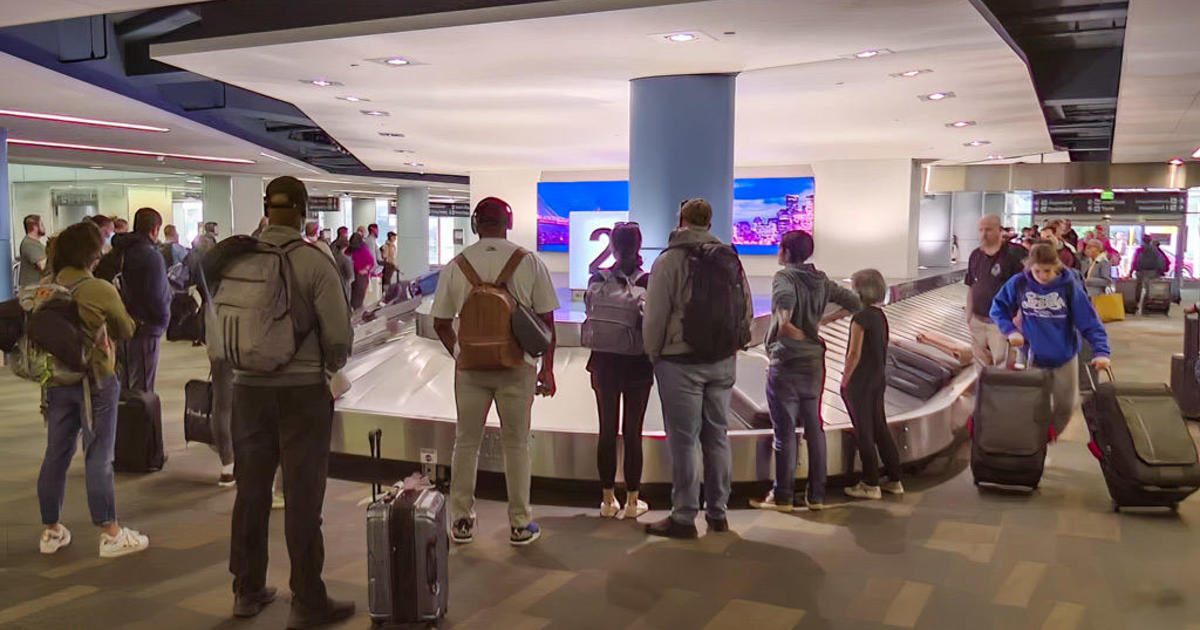Fact-Checking Trump On Immigration, Family Separations
(CNN) -- President Donald Trump on Tuesday delivered a stream-of-consciousness-style speech on immigration as furor over his administration's separation of families at the border reaches a fever pitch.
But his speech at a small business event in Washington contained several factual inaccuracies.
Here is what Trump said, and what the reality is.
False claim: Family separations are Democrats' fault
Trump said the family separations at the border are "a result of Democrat-supported loopholes in our federal laws" that he said could be easily changed.
"These are crippling loopholes that cause family separation, which we don't want," Trump said.
The reality: Trump's administration made a decision to prosecute 100% of adults caught crossing the border illegally even if they came with children, and thus are separating parents from their kids at the border with no clear plan to reunite them after the parents return from jail and court proceedings.
The administration has long wanted to roll back a law unanimously passed under President George W. Bush and a court settlement dating back decades but most recently affirmed under the Obama administration -- citing those two provisions as "loopholes." Both were designed to protect immigrant children from dangers like human trafficking and to provide minimum standards for their care, including turning them over to the Department of Health and Human Services for resettlement within three days of arrest, as opposed to being held in lengthy detention, and dictating that children with their families also cannot be held in detention or jail-like conditions longer than three weeks.
The administration has complained the laws make it harder to immediately deport or reject immigrants at the border, and that they are not able to detain families indefinitely.
False claim: Thousands of judges
Trump said his administration was hiring "thousands and thousands" of immigration judges, that the US already has "thousands" of immigration judges and that other countries don't have immigration judges.
In reality, there the Justice Department's immigration courts division has 335 judges nationwide, with more than 100 more judges budgeted for, according to a DOJ spokesman.
Because of a massive backlog in the immigration courts, it can take years for those cases to work their way to completion, and many immigrants are allowed to work and live in the US in the meantime, putting down roots. The funding for immigration courts and judges has increased only modestly over the years as funding and resources for enforcement have increased dramatically. A proposal from Sen. Ted Cruz, R-Texas, to address the family separation issue would double the number of judges to 750.
Trump's comments Tuesday echoed remarks he made last month. In a May Fox News interview, he claimed the United States was "essentially the only country that has judges" to handle immigration cases. But that is incorrect.
A number of other countries have immigration court systems or a part of the judiciary reserved for immigration and asylum cases, including Sweden, the United Kingdom and Canada.
False claim: Virtually all immigrants disappear
Trump also claimed falsely that when immigrants are let into the country to have their cases heard by a court, they virtually all go into hiding.
"And by the way, when we release the people, they never come back to the judge, anyway. They're gone," Trump said. "Do you know if a person comes in and puts one foot on our ground, it's essentially, 'Welcome to America, welcome to our country.' You never get them out because they take their name, they bring the name down, they file it, then they let the person go. ... Like 3% come back."
In reality, the number of immigrants who don't show up to court proceedings is far lower. And many of the immigrants released from detention are given monitoring devices such as ankle bracelets to ensure they return.
According to the annual Justice Department yearbook of immigration statistics from fiscal year 2016, the most recent year for which data is available, 25% of immigration court cases were decided "in absentia" -- meaning the immigrant wasn't present in court. In that year, there were 137,875 cases. The number of cases decided "in absentia" between fiscal year 2012 and fiscal year 2016 was between 11% and 28%.
When White House legislative chief Marc Short made a similarly inaccurate claim on Monday, the White House pointed to a statistic about the high percentage of deportation orders for undocumented children that were delivered in absentia, but amid total case completions for minors, the number of in absentia orders has ranged from 40% to 50% in recent years.
Advocates for immigrants attribute some of the missed hearings to often not receiving a court notice mailed to an old address or not having an attorney who can adequately explain the process to the child. Studies have shown that with legal advice and guidance, immigrants are far more likely to show up for hearings and have their claims ultimately be successful.
False claim: Countries are sending bad eggs to the US
Trump said that countries deserve to be punished for illegal immigration, and that they "send" bad eggs to the US.
"They send these people up, and they're not sending their finest," Trump said.
He continued: 'When countries abuse us by sending people up -- not their best -- we're not going to give any more aid to those countries."
In fact, there is no evidence that countries "send" anyone in particular to the US -- rather analyses of recent immigration flows have shown that in recent years, a much higher number of Central Americans have come to the US fleeing rampant gang violence and instability in especially the countries of El Salvador, Honduras and Guatemala. Experts who study the countries agree that cutting aid would only further destabilize the region, likely making illegal immigration worse, not better.
Though gang members do cross the border illegally alongside those fleeing violence, the administration has never been able to provide numbers showing that those are a large percentage of the cases. Only a handful of such prosecutions occur a year, while more than 300,000 people were apprehended trying to cross the border illegally last fiscal year. Nearly 120,000 defensive asylum applications were filed last year, according to government data, meaning those individuals believed they were fleeing violent situations back home.
False Claim: Mexico isn't helping the US
Mexico, Trump said, "does nothing for us."
As for Mexico's contribution, experts say the country's crackdown on immigrants within its borders has been a major help to the US in recent years. According to statistics from the US and Mexican governments compiled by the nonpartisan Migration Policy Institute and shared with CNN, over the past three years, Mexico has deported tens of thousands more migrants back to the primary countries in Central America that drive immigration north. Each of the last three years, Mexican removals exceeded US removals to those countries.
Mexico is also apprehending tens of thousands of Central Americans before they reach the US. According to the data, Mexico intercepted 173,000 Central Americans in fiscal year 2015, 151,000 in fiscal year 2016 and just under 100,000 in fiscal year 2017.
In the past two years, Mexico has lagged behind the US in apprehensions, but Migration Policy Institute President Andrew Selee, an expert on Mexican policy, said that could be due to a number of factors including smugglers successfully changing their routes to avoid detection or relations with Trump.
© Copyright 2018 CNN. All Rights Reserved. This material may not be published, broadcast, rewritten or redistributed.



